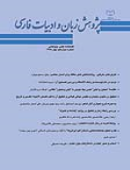ردپای ایدئولوژی در آثار اولیه محمود دولتآبادی
محورهای موضوعی : Research in Iranian classical literature
1 -
کلید واژه: نقد ادبی ادبیات داستانی معاصر ایدئولوژی گفتمان محمود دولتآبادی درونمایه شخصیتپردازی فرهنگ غیر بومی,
چکیده مقاله :
محمود دولتآبادی یکی از داستاننویسان بزرگ ایران است. او با تلاش و جدیت در امر خلاقیت ادبی توانسته است خود را در جامعه ادبی ایران و تا حدی جهان تثبیت کند. دولتآبادی مانند هر نویسنده بزرگ دیگر مراحل رشد و تکامل هنری خود را گام به گام پیموده و از پیچ و خمهای دراز دامنی گذشته است. تحت تأثیر گفتمانهای متعدد و مدام نوشونده تاریخ معاصر ایران قرار گرفته و آثارش را در واکنش و پاسخ به این گفتمانها خلق کرده است. در این پژوهش، داستانهای بلند او را که به یک اعتبار میان داستان کوتاه و رمان معلق ماندهاند، از نگاه تأثیر مستقیم و غیر مستقیم ایدئولوژی و گفتمانهای رایج در دهههای چهل و پنجاه هجری بررسی کردهایم. این آثار به لحاظ زیباشناختی دارای ضعفهایی است، اما نویدبخش نویسندهای بزرگ هستند که با نگارش کلیدر، جای خالی سلوچ و روزگار سپری شده مردم سالخورده به حقیقت میپیوندد. اما از نظر درونمایه و پرداخت شخصیتهای داستانی، دولتآبادی شاید بدون آنکه خود اشرافی بر این امر داشته باشد، در دامنه اثرگذاري ایدئولوژی و گفتمانهای روزگار خود قرار میگیرد و مضامینی را به دنیای داستانهایش وارد میکند که با محیط فرهنگی خود چندان سنخیتی ندارند و آدمهای او نیز ریشههای خود را از سرزمین فرهنگ بومی کندهاند و غرب پروردگانی هستند که تنها زبان و لباس بومی بر تن کردهاند.
One of the greatest Iranian novelists is Mahmoud Dowlatabadi, who is celebrated enough in the literary society of Iran and to some extent in the world due to his creative works. He has also gone forward in his works step by step, like every other author. In fact, he has been affected by various and continually renovating discourses of contemporary history of Iran in such a manner that a part of his works has been written in response to theses discourses. In this research, the direct and indirect impacts of ideology and common discourses on Dowlatabadi’s novelettes in 40th and 50th decades are studied in terms of their being between novel and short story. These works were promising with a great author regarding to the writing of Kelidar, Missing Soluch, Bygone Days of the Elderly, although they might have a range of weak points as well. Furthermore, in choosing the themes and the characters which he has created and developed through his novelette, he may have been influenced by the ideology and discourses of his own time without being conscious. Finally, the topics used in his novelettes as well as the characters are not in harmony with their roots and their local culture, that is, they are not created for the referred culture and the characters just speak in Persian and wear local cloths without having any other common root with the country they live.

